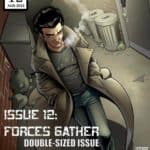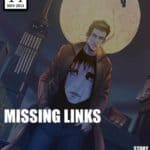Part Four
Holt wakes up with a sudden, sharp surge of adrenaline, his mind screaming. Danger! Danger! Over and over again it screams, urging him to move, urging him to flee, and he’s absolutely convinced it is giving him the best advice he’s ever received.
It’s advice he can’t take. He can’t move.
He’s lying on his back, staring up into darkness. He can’t see anything, but he’s lying on something cold. Stone, he thinks—it feels like he’s lying on smooth stone, maybe concrete. It’s cold enough that he shivers slightly—apparently he can move some—but he can’t do much else. He can hear sounds: he hears the sound of someone breathing next to him, the slow, regular pattern of someone sleeping. Above him he hears a dull, distant roar… no, not a roar, but the sound of something rushing over him and around him.
Why is it so cold? Holt tries to raise his head, but he can’t. He tries to speak, but he can’t. He tries to make any noise at all—a whimper, anything—but he can’t. The most he can do is breathe. He tries to take a deep breath, and succeeds. He tries to take a series of short, shallow breaths, and succeeds.
“Good morning!” The sound of the small man comes from somewhere to his right. “Very early morning. Almost two, I think. And yes, it’s true, you can’t move. It’s a thing we do. It makes the next part easier.”
Holt takes in a quick, deep breath. He tries to cry for help, but he can’t.
“Oh, it won’t work, Ronald,” the small man says. “We’ve stolen your voice. Stolen right out from under you. That also makes the next part easier. There’s quite a bit of concentration involved, and it wouldn’t do to have you messing that up. We only get one try to get this right…”
Light flickers from the corner of Holt’s vision, and a second later torchlight—he thinks it’s torchlight—illuminates the only thing he can see. Far above him is a stone ceiling. It’s curved ever so slightly, creating a broad dome. Etched into the ceiling are pictures, or symbols, or… something. He doesn’t understand what he’s looking at. He can’t tell if they’re abstract pictures of some kind of animal, or if they’re letters in a language he’s never seen before.
And then, a moment later, he sees the face of the small man peering over him. He’s still dressed in that suit, still wearing the bowler hat. The grin is gone from his face, replaced with an expression of pensive solemnity.
“It’s raining again,” the small man says.
Holt looks up at him, mute and fearful.
“That’s significant, you see.” The small man nods once. “It was infinitely difficult to build the sewers under this city—oh yes, we had them built when we restored the city. The soil down here makes digging tunnels difficult. Especially near the beaches. And our requirements were rather exact… it was expensive, and took an intolerably long time. But it was worth it.”
Holt tries to move his eyes, but he can’t. He tries to blink, but he can’t do that either. His body can blink—he feels himself do it from time to time—but he can’t make himself blink. It’s maddening.
“The secret, you see…” The small man looks lost in his own thoughts. More like the expression on the large man’s face than his usual manically friendly demeanor. “The secret is that certain parts of the sewer are graded in very specific ways, so that when water comes into the sewers—specifically, the volume of water that comes in from certain storms—certain passages get more water than others. And all those passages connect, and all flow in the same direction, so that after a while you get a current that flows in the shape of a very distinct, very old pattern.”
The small man raises a hand and traces a pattern in the air over Holt’s face, so he can see it. Every time the small man’s hand passes over his face, Holt feels himself shudder. He tries to picture the symbol in his head. He can’t, but each line of it fills him with a pain that goes beyond fear.
“It doesn’t mean much to you, I’m sure,” the small man says. “Well, that’s not true. I suspect it means rather a lot to you. Or it will, very soon. From your point of view the meaning is fixed. It has no context to put it in. You simply know that it exists, and its existence will negate your own. Not a happy meaning, I’ll grant. But for us… well. I won’t bore you. I’m told I can get rhapsodic when I talk about the metaphysics involved.”
The small man ducks out of view, walks swiftly back to the right, where Holt first heard him. “Nevermind. It’s time to begin.”
Steel scrapes against stone. Holt realizes it’s the sound of a knife against a whetstone. His flesh crawls as he hears the skreet skreet skreet of the metal against the stone. He wants to whimper. He can’t.
“It’s unfortunate, I suppose,” the small man says. “I mean, you really have little to do with any of this. Not that it matters to the ceremony, but you were chosen in order to send a message to your masters, one I hope they will heed in the future. It would be a more effective message, I think, if you were a willing co-conspirator. If they didn’t tell you, your loss may not move them overmuch. But it should have some effect, I think. At the very least, they will know that we know. And in the end it will balance the scales somewhat. You will serve the city your masters damaged, in the end.”
Steps grow louder, and the small man comes into view once more, peering down at him. “I do regret you must be awake for your part, but only one of you can have the mercy of sleep. And he’s certainly more deserving of it than you, for many reasons.”
The small man shifts his weight, steps back until he is at the corner of Holt’s vision. Holt sees a glint of steel, and then his gaze is fixed on the knife held over him. It’s a modern knife, with a carbon steel blade and a plastic, ridged grip.
The blade is very long.
The blade is very sharp.
“There was a time,” the small man says, “when every farmer knew the best way to secure a good harvest was to spill the blood of a stranger on his soil. Blood is life, after all. Power. That power and that life would seep into the soil, into the roots, and into the crops themselves. Of course, you need more than that—all the blood in the world won’t help you if you’re a terrible farmer. You also need to know how to grow the crops, and a long succession of lazy, incompetent farmers led people to believe that these rites were nothing more than dark superstition.”
The small man’s face comes into clearer view as he leans over. “We know better.”
His face recedes to the edges again. “Farraday City is full of strangers, Ronald. Very few people actually put down roots here—they come here believing they can get rich quick, enjoy the high life for a while, and then move on. The people who get trapped here never consider it their home, they consider it a prison. There are very few who actually have any true, deep ties to this place, so we have our pick when it comes to finding blood to spill.”
The small man holds the knife above Holt’s forehead, tip pointed down. The spot where he imagines the tip might come to rest starts to itch furiously.
“Plenty of stranger’s blood,” the small man continues. “Blood for our farm. Because that’s what Farraday City is, in the end. It’s a farm, one we have plowed and planted and tended and protected ever since we first set foot on its ground. It is a farm, and we are farmers. And this morning, Ronald, you and your companion will spill your blood upon our farm, and your blood will sink into the soil, and it will go into the roots of our crop, and your blood and your power will nourish it as we tend it, and it will grow larger and stronger. It will grow, and blossom, and flourish, and you will be the reason why.”
The tip comes down, ever so gently, on his forehead.
“But what is this crop? I hear you ask. Well, it’s a fair question, Ronald, and I’ll not begrudge you the answer. In truth, your knowledge is needed to make the ceremony work. Did you ever wonder why, in all those stupid, shallow stories, the villain always reveals his master plan to the hero? It makes no sense, but you see it in movies, books—everything. All the time. Did you ever wonder why? Well I’ll tell you.”
The tip presses down. Just a little.
“It’s because the stories are echoes of a shadow of an older truth: desperate, futile knowledge feeds anguish, and anguish feeds what we do. What we grow.”
Holt can feel the tip cutting into his forehead. Blood trickles down the side of his face, pooling in his right ear.
“We grow sin,” the small man whispers.


